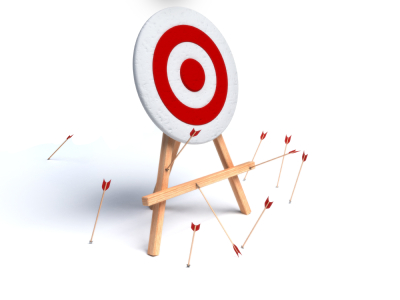Do I Own The Wins AND The Losses?
“When an archer misses the bulls eye, he doesn’t blame the target.”
What is it about our human nature that causes us to seek excuses for when we fall short? Even some of the best sales people and leaders I have been around, can identify something outside of their control that caused them to miss their goals.
Excuses are easy. Breaking the habit of making excuses is hard. I addressed the way West Point handles habitual excuses in an older blog: West Point: How Leaders Seize Responsibility.
But, what if we turned our thought process around? What if we questioned who was responsible for the wins in our lives?
A Basketball Example
The irony of our reactions to wins and losses hit home to me one year during the high school basketball season. I have boy/girl twins who both started on varsity for a few years.
- When our team lost a basketball game, we often blamed the officiating. These are part time officials who did their best. But, if we lost, bad officiating’s role was always a big part of the post game analysis.
- When we won, we talked about our teams toughness, experience and skill. We never discussed that officiating could have contributed to the win. I have no doubt the losing team would have a different story.
These were not the conversations of just some upset teenagers. It would be easier to understand since they were the ones who actually practiced 2 hours a day, five days a week. But, I heard these comments throughout the games from parents too.
Isn’t it equally likely that bad officiating hurt us in our losses AND helped us in our wins?
A Work Example
During a conversation with one of my salespeople, I discovered we had both fallen into a similar discussion about our circumstances.
We were discussing the difficult quarter we had just finished. Our performance was underwhelming, and we were diagnosing the issues.
- Headquarters’ quotas were too high this year.
- A major customer had closed his doors thus driving our sales down.
- A new competitor had entered the market. Customers are always going to try something new. Our product was launched 3 years ago.
The more we discussed our circumstances, the more frustrated I became. We weren’t owning our results. I hate that in others. But, this time it was me!
Then I asked a tough question:
“If circumstances play such a big role in our losses, wouldn’t it make sense that they played a big role in our wins as well?”
There was an uncomfortable silence at first. Then we both smiled and began to laugh. The truth hurt. But, the irony of it was funny as well.
Applying The Question
When we apply that question to my sales situation, it shines a very different light on my wins and my losses.
- If high quotas are to blame for my failure this year, could low quotas be to blame for my success in the past?
- If a big customer moving out hurts my performance, how much did it help when they moved in? Or others moved in?
- If customers are always going to try something new, could that be the reason we did well the previous years?
I did not create the high quotas or the low quotas. I did not ask customers to leave my territory or to move into my territory. I did not implant the desire for the new products over the old products into my customers.
The positive AND the negative circumstances were not in my control. Yet, in each winning example, I was more than happy to accept the accolades and own those wins. I acted as if I was in control.
In each losing situation, I acted as if I had no control. The circumstances were what controlled my results. So do circumstances decide my winning or losing? Partially.
The Bottom Line:
If I am going to own my wins, then I must also own my losses. There will be circumstances that work against me and there will be circumstances that work for me. That will never change.
I must begin with the mindset that no matter the circumstances, I will own my results. This is the jumping off point for most problem solvers. Problem finders focus on the circumstance. Problem solvers focus on their reaction to the circumstance.
Problem finders are everywhere. I want to be a problem solver. I want to hire problem solvers as well.
Circumstances don’t determine a problem solver’s failures or their successes. Circumstances only determine what a problem solver’s reaction will be. It is our reaction to our circumstances that determine winning or losing.
Question:
When have you worked with someone who blamed the circumstances for his failures?


Hi Dave
Well it’s a difficult question you pose, so no wonder it’s a bit quiet!….. a good one though.
I like Jim Collin’s treatment of the same question in his 2001 book “From Good to Great”, where in describing what he calls “Level 5 Leadership, one of his criteria is that the transformational leader would “look in the mirror (ie themself) to apportion responsibility for poor results,…. and look out of the window to apportion credit for success to other people, external factors and good luck” I feel that’s a good default position and yet we are human and need to get satisfaction and grow confidence from our successes, especially in this very hard economic climate.
I love the reference to Good To Great! Very applicable.